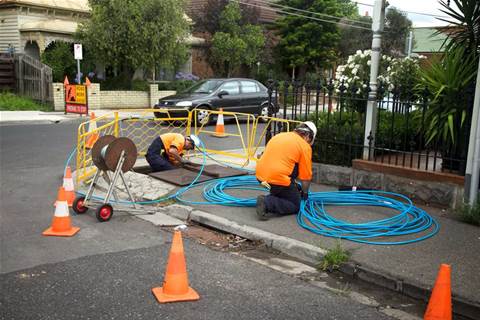Telstra has dismissed suggestions it should advise its own wholesale customers when a copper or HFC line it leases to them is to be temporarily cut by NBN fibre crews in order to connect a home to the National Broadband Network.
Almost two months after the competition watchdog first raised concerns over the controversial 'pull through' method for NBN cabling, there is still little clarity on how it will work and where key responsibilities lie.
Pull through sees NBN contractors sever a home's existing communications cable. One end of the old cable is tied to the new NBN fibre cable, and contractors literally haul it up through the old conduit to the house.
ISPs generally consent to the 'pull through' method being used but want to be given notice by Telstra, NBN Co or the NBN contractor of exactly when the old line is to be cut — so they can manage the fixed line service interruption with their retail customer.
Telstra will be given an hour's notice of an NBN contractors' intention to sever a cable for 'pull through', but does not believe it should pass on that notification to the ISP that provides retail services on the affected line.
"The limited notice which Telstra can give (less than an hour) is unlikely to be of much practical value to the current wholesale customer in managing any service interruption," Telstra said in a submission. (pdf)
Despite having an hour's notice of decisions to cut into its cables, Telstra argues it "has little, if any, control" and an "extremely limited" role to play in communicating that information to the provider of retail services on that line.
"Pull through is a process that is conducted in a practical sense by NBN Co and not by Telstra," the carrier said.
"Telstra has no control over when or how pull through processes are undertaken in respect of wholesale customers' copper services."
Telstra argues ISPs have plenty of time to make alternative arrangements for internet and phone services for end users in case existing connections are switched off for pull through.
Effectively, those arrangements can be made from the time an NBN order is lodged, Telstra argues. ISPs should put such arrangements in place pre-emptively, in case they are required, though the ISP may never know if pull through will occur for that end customer.
Telstra is attempting to play down a much more integral role that the ACCC sees the carrier as having.
"Telstra will have an important role to play as an intermediary between its wholesale customers and NBN Co and its contractors," the ACCC wrote in a consultation paper in December last year. (pdf)
"That said, at this stage there is a lack of clarity regarding the precise nature of the roles and responsibilities that all parties will take on in the end-to-end pull through process, or the extent to which all parties will in fact cooperate to ensure that pull through is undertaken in an appropriate manner".
Telstra said it "expects that NBN Co may consult with the relevant end user ... prior to conducting pull through".
ISPs seem unconcerned with who notifies them of a pull through attempt, as long as someone does.
Liability waivers
Something ISPs are keen to see altered is who is liable when pull through goes awry. ISPs that generally agree to pull through being used for their customers must sign a "deed poll" that effectively makes them liable for a process that they have little direct control over.
"The draft Deed Poll includes a number of clauses that release NBN Co and Telstra from liability from any loss or claim relating to the operation or lack of operation of the existing copper services that may arise from pull through," the ACCC noted in December.
While NBN Co will install a temporary cable if pull through doesn't result in a usable service, the ACCC noted that no one seemed to be responsible if the temporary cable failed.
Optus has branded the waivers as "neither reasonable nor acceptable".
"A critical concern is that whilst wholesale customers will have no visibility of or control over the pull through process, nevertheless they are expected to assume almost all liability for the process," Optus said in its submission. (pdf)
Optus believes a deed poll is the wrong format to collect consent and outline liability.
"It should be set out by means of a three party agreement between NBN Co, Telstra and the wholesale customer," Optus argued.
"The responsibilities of each party should be clearly stated with all relevant parties being accountable for their part of the process."




.png&h=142&w=230&c=1&s=1)


_(21).jpg&h=142&w=230&c=1&s=1)
.jpg&h=142&w=230&c=1&s=1)




.jpg&w=100&c=1&s=0)











